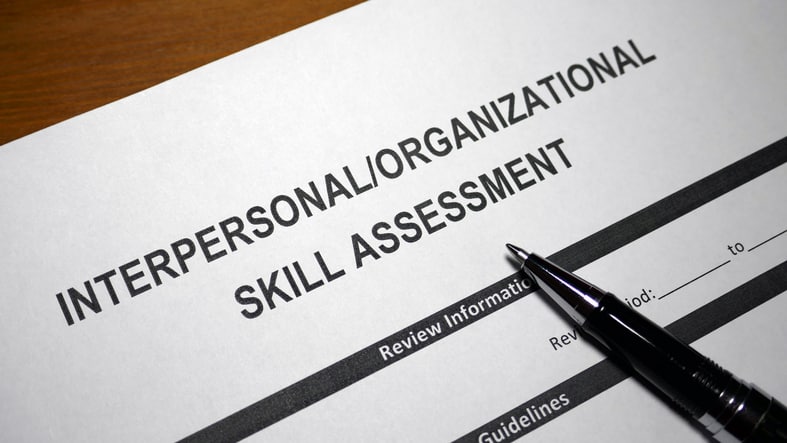The behaviors you display when interacting with others are known as interpersonal skills. They cover a wide range of verbal and nonverbal abilities that enable you to interact effectively with others, exchange ideas, collaborate effectively, and generally integrate into a group, team, or enterprise. The more interpersonal abilities you have, the more you will contribute and connect with others. Interpersonal skills are also known as soft skills, or social skills or people skills. People with good Interpersonal Skills have better social image as compared to those who don’t have good interpersonal or communication skills.
Lets explore more about Interpersonal Skills!
- What Are Examples of Good Interpersonal Skills?
- Importance of Interpersonal Skills
- What are Interpersonal Communication skills?
- How to improve your Interpersonal Skills?
- Importance of regular feedback in improving skills
Your interpersonal abilities might help you stand out from others with similar technical knowledge. Interpersonal skills enable you to communicate, gain buy-in, and bring out the best in your team members. It requires someone with excellent interpersonal communication skills to form a cohesive team in the first place, and it’s doubtful that you’ll get promoted to more senior roles without it. In a nutshell, we can say that Interpersonal Skills :
- Enable you to effectively communicate
- Help in team building
- Help in effective team management
- Enable you to contribute and connect with others.
What Are Examples of Good Interpersonal Skills?
Interpersonal abilities are acquired during the course of our life. Unfortunately, there is no patience class in primary school or an empathy program in college. These abilities are both within us and outside of us. They are skills that we develop as a result of our life experiences.
Some people are born with a natural ability to communicate with others. They intuitively know what it takes to get along with others, even if they have no idea what interpersonal skills are!
And there, in a nutshell, is the genuine beauty of interpersonal abilities. You can have and cultivate these life-changing abilities to mould and define your destiny for the better, whether or not you know how to define them.
Some of the interpersonal skills include:
- Active listening
- Collaboration
- Problem-solving
- Conflict Resolution
- Empathy
- Diplomacy
- Adaptability
- Leadership
- Mediation
- Patience
- Analytical Thinking
- Team Work
- Emotional Intelligence
- Negotiation
- Influencing Skills
Importance of Interpersonal Skills
Interpersonal skills are abilities that can be applied to a wide range of situations in our life. These abilities will come in handy in every aspect of our journey! They aren’t simply about getting along with other people. It’s a set of life skills. They also assist us in communicating and relating to others.
Where we would have lost patience and started an argument before, we now seek understanding and tolerance. Where we might have previously dismissed someone else’s problems with callousness, we now reach for empathy and compassion.
Simply put, regardless matter how creative or technically adept you are, your interpersonal skills can make or ruin your career. You’ll be able to improve your team’s efforts and produce value if you demonstrate attributes that make others warm up to you and want to work with you.
Because you’re exhibiting your leadership talents, your ability to work well with others and keep people engaged can lead to development and promotion. Finally, your ability to relate to your co-workers and adjust to changing situations will help you establish a pleasant work atmosphere by reducing minor disputes that may otherwise arise.
Pro Tip: How to highlight Interpersonal Skills on your Resume
You can include interpersonal skills on your resume as well as cover letter. For example, you can write: Self Motivator, Active Listener, Innovative researcher etc.
What are Interpersonal Communication skills?
The majority of the problems we have with others are caused by miscommunication of some sort. Miscommunications come in a variety of forms. We may help smooth and simplify our relationships with others by developing and improving our interpersonal communication abilities.
So, here are two of the most crucial interpersonal communication skills, along with examples of how they might help you:
Active Listening– Active listening is a powerful strategy for improving communication. This interpersonal skill’s significance cannot be overstated.
Active listening is a communication strategy in which the listener actively participates in what is being said. The listener’s whole attention is focused on the person speaking. Visual signals are frequently offered to the speaker to indicate that they have given them their complete attention.
The following are examples of active listening cues:
- Make direct eye contact.
- Nods of approval
- Smiles Verbal affirmations like “yeah,” “ah,” or “mhmm.”
These cues indicate to the speaker that the listener is actively listening rather than just hearing them.
Body Language– How others interpret what you say is heavily influenced by your body language, posture, and facial expression. We convey subliminal signals to everyone around us with our bodies all of the time, without even recognizing it. Does this imply that you should be more conscious of your body language?
Yes! You are.
Body language is an interpersonal communication skill that focuses on the stories we tell with our faces, hands, eyes, and posture. Our message is unlikely to be taken properly if our bodies reflect disinterest or apathy while we’re trying to communicate effectively.
Others are welcomed in with open body language. It assures them that you are trustworthy and safe, and it encourages them to interact with you on a more personal level.
Interpersonal Communication Skills fall into the following clusters:
Verbal– Verbal communication occurs whenever you speak or make an audible sound (for example, “hmm” or “Ahh!”). Aural elements like intonation play a role in verbal communication. This relates to how the tone of your voice rises and falls as you speak. This might influence how the words are interpreted.
Listening– You’ve probably been accused of “hearing but not listening” to something someone said to you at some point in your life. The distinction between the two notions may have been ambiguous initially, but the message became clear: hearing is automatic and involuntary, whereas listening is deliberate and intentional.
Hearing is a natural response that occurs as a result of having functioning ears. Listening necessitates a greater amount of effort. It has a purpose and necessitates attentiveness to comprehend what the speaker is saying.
Written– You’re practising written communication when you send a message using written symbols. Written communication is the foundation of most information sharing in business, from emails and text messages to more formal memoranda and reports.
When complex or lengthy information needs to be delivered, it is frequently done through textual communication. As a result, written communication is frequently seen as more legally valid than verbal communication. As a result, it is frequently used as an “official” means of communication. Emojis can be used in written communication to convey extra emotional information and context that is difficult to determine from the words alone.
Non-Verbal– The essence of nonverbal communication is conveying meaning without using words, whether written or spoken. This can be accomplished through various means, including facial expressions, gestures (“jazz hands,” anyone?), body language, and postures.
Consider how mimes can tell entire stories without saying a word to get an idea of how much may be transmitted through nonverbal communication. Furthermore, nonverbal communication is frequently used in conjunction with verbal communication.
Also Read: What is a Mock Interview?
Pro Tip: Showcase your Interpersonal Skills
Match your Interpersonal skills while reviewing Job Description. Make a list of interpersonal skills that employer is looking for. Ex: ” My ability to lead helped me raise the sales by 10% for last quarter, despite the fact that there were a lot of new joiners”
How to improve your Interpersonal Skills?
Although Interpersonal skills can be developed, but some people have it naturally. Self-awareness, an intrapersonal talent, is crucial to realizing the full potential of interpersonal abilities. Being self-aware in your everyday contacts with others, as well as how others react to you, is critical to the development of your interpersonal skills.
Finding out how much your personal picture of yourself coincides or misaligns with the vision others have of you is a common challenge. It’s tough to make concrete goals for improving your interpersonal skills, track your progress, and figure out how to improve without regular feedback.
The good thing is that you can request feedback at any time. If you ask, most people are willing to offer their opinions and perceptions. You can’t improve your interpersonal skills until you know where you thrive and where you need to work on them.
You can ask for clarifications and narrow down the range of skills and talents you need to improve after obtaining comments. You can utilize this knowledge to direct your personal development in the most crucial areas to your success. Look at some more ways to improve Interpersonal Skills:
- Identify scope of improvement
- Maintain good posture as body language plays important role in interpersonal skills.
- Choose your language carefully.
- Record your conversations (if possible), for self reflection.
- Start taking responsibilities.
- Be more appreciative towards others.
- Promote positive work culture.
You can also take up English spoken classes online free. This will help you improve your English spoken skills and communicate effectively.
Also Read: How to improve your communication skills?
Importance of regular feedback in improving skills
Individuals can develop interpersonal skills by engaging in a variety of activities. To achieve organizational success, it is critical for any workplace to sustain positivity, productivity, and team dynamics.
The development of needed interpersonal skills benefits every member of an organization. If you’re a leader or an employer who notices that your employees lack this talent, there are techniques to develop your interpersonal abilities, which we just discussed.
You can’t work on anything if you don’t know whether or not it needs to be improved. Getting comments weeks, months, or even a year after your last interaction with a peer, on the other hand, isn’t helpful. The moment is no longer fresh in either of your memories at that point. Therefore you won’t be able to draw particular conclusions from the comments.







